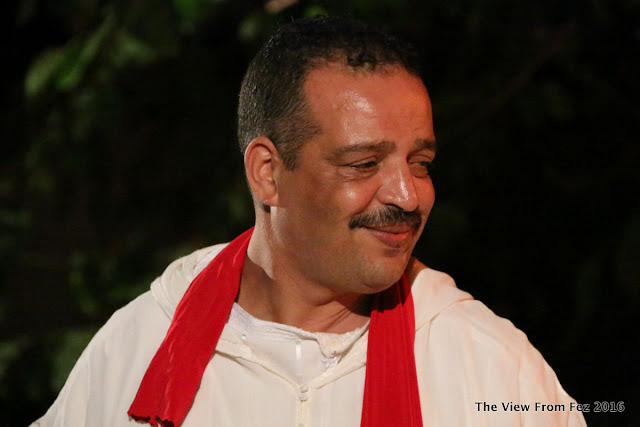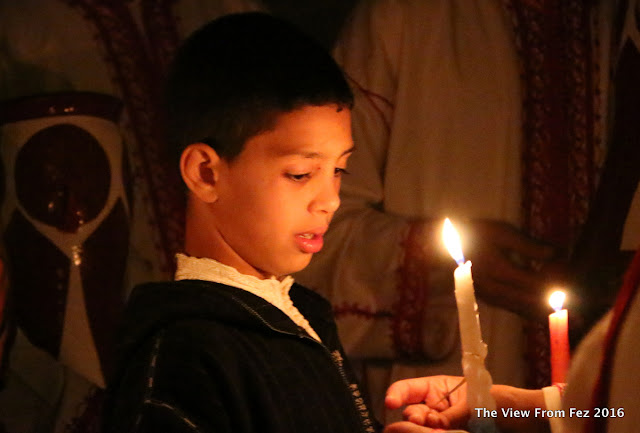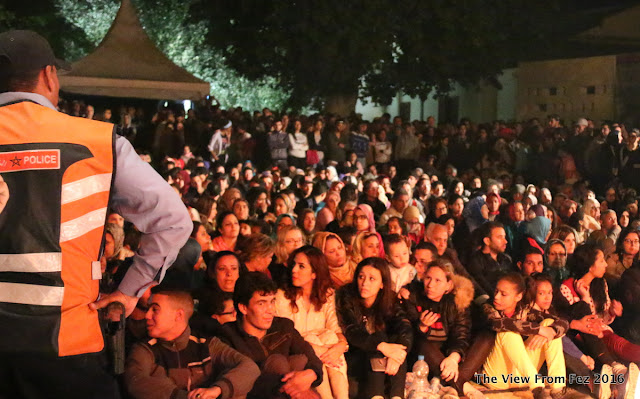Dar Tazi was packed well before 11 for the final night, the Hamadcha from Fez. Every year mqaddem Abderrahim Amrani’s group draws crowds of medina-dwellers who know he will provide an evening which combines lively performance with a deep understanding of Moroccan cultural heritage and the poetry used by the Hamadcha - Faith Barker reports...
 |
| mqaddem Abderrahim Amrani |
The group entered holding candles and doing the hadra, as they would in a lila. The hadra of the Hamadcha has a distinctive, almost jazzy beat, and is a part of the ritual where people can trance from the feeling of hal, divine ecstasy. The musicians assembled in a line onstage, some beating the large clay gwel drums, and with the players of the ghaita, a piercing oboe-like instrument, behind them. Others joined hands and rocked back and forth in the rolling dance of the hadra. Mustafa Khalili, a well-known actor in Morocco from years gone by and a devotee of Hamadcha, came forward and faced off with the mqaddem, rocking and leaping from side to side.
 |
| The Hamadcha entered by candlelight |
 |
| Mustafa Khalili |
The crowd reached a fever pitch until Abderrahim Amrani brought the hadra to a close with a wave of his arms. The musicians settled into their places – tonight they were cross-legged on cushions rather than sat on chairs, creating an atmosphere closer to that of a lila in a house. Full disclosure: I spent a year doing research and performing with the group. In that year, Abderrahim began teaching local teenage boys the tradition, and it was heartening to see that several of them had stayed with him, grown up and become true Hamdoushis.
 |
| Mohammed Soussi |
The group sang the aroubiyat, an opening section for the ritual, and Mohammed Soussi, a celebrated malhoun singer and friend of Abderrahim, sang some mawwal before the group went into the songs with the guembri, a three-stringed guitar-like instrument used by the Hamadsha and gnawa. Unfortunately, these slower sections were disappointing because of the sound quality – somehow they could not provide microphones for all the singers so their voices were unevenly amplified, and the guembri was inaudible – and because Abderrahim sang very little, preferring to give the limelight to other mqaddems he had invited from other cities in Morocco.
 |
| Mohammad Semlali - drumming and singing |
Things picked up when they went into some Issawa songs, led very capably by Mohammad Semlali. In his early twenties and the son of an Issawa mqaddem, Semlali has a beautiful voice and a sense of showmanship. He got the audience to sing along with the well-known songs, encouraging them to get louder. The cries of the zaghrit, the exclamation of “salam ala rassoul allah”, rang out and the vast crowd cheered and danced as the unmistakeable noise of the ghaita started up again when the Hamadcha went back into the hadra.
 |
| There is no minimum age for being an Hamadcha devotee |
 |
Dar Tazi’s security, beefed up by a large number of police officers, was visibly anxious. The Hamadcha evenings are known for getting a bit out of hand, and the place was so full that the audience had spread right down to the back of the stage. But security made the situation worse by trying to force the Hamadcha to cut their performance short by half an hour. The crowd were having none of it and got to their feet, demanding Abderrahim’s signature song, Aicha. Abderrahim implored the crowd to stay under control, “because there are foreigners and old women here,” and launched into his version of a song for Aicha. He uses a melody from gnawa and has changed the words to be about the queen of the spirits. Chaos ensued, with several young women falling into violent trance. One girl at the front of the stage was holding on to two policemen as she whipped her hair up and down, at one point getting to her hands and knees on the ground.
The performance ended at one as it was supposed to, and it is to be hoped that the security will be better prepared for the Hamadcha next year. The sound might have been terrible, some of the voices ropier than other tariqas, but their performance is an experience which is a highlight of the festival every year.
Review: Faith Barker. Photographs: Sandy McCutcheon
SHARE THIS!




No comments:
Post a Comment